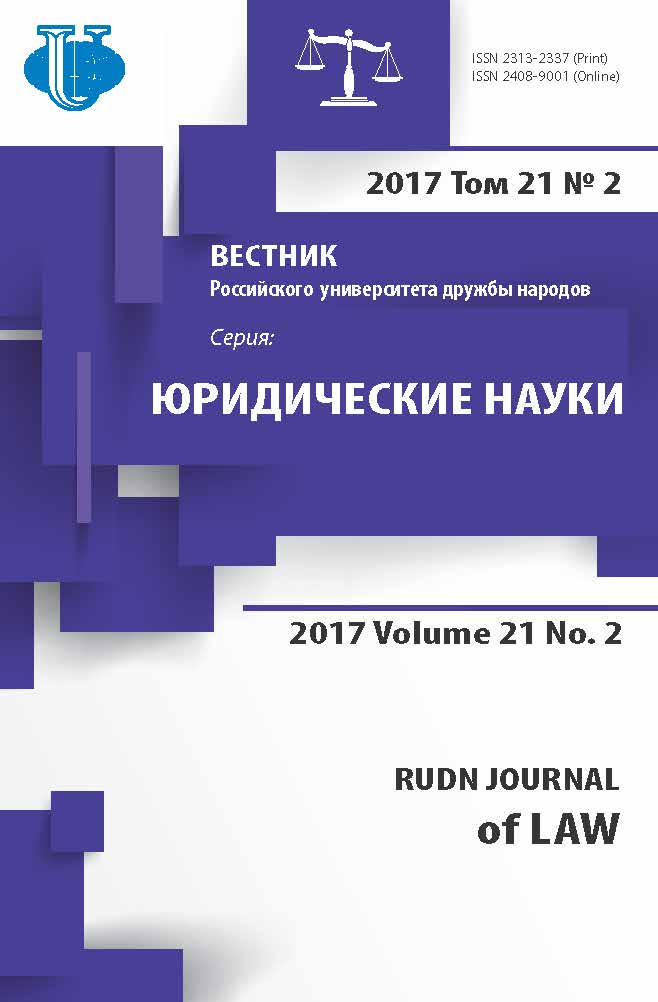Some Peculiarities of Most-Favoured-Nation Clauses in International Investment Law
- Authors: Rogozina A.A1
-
Affiliations:
- Ural State Law University
- Issue: Vol 21, No 2 (2017)
- Pages: 263-277
- Section: Articles
- URL: https://journals.rudn.ru/law/article/view/16324
- DOI: https://doi.org/10.22363/2313-2337-2017-21-2-263-277
- ID: 16324
Cite item
Full Text
Abstract
The most-favoured nation clause is applied in international law in a different way in comparison to its application in international trade law. The article deals with the two possible ways how the most-favoured-nation clause can be applied, namely incorporation and de facto application. First, within the framework of international investment law the incorporation of standards of investment protection from the other international agreements often leads to the full-fledged „redrafting“ of the main bilateral investment treaty, and therefore, the uncertainty as regard to the obligations of the host State. Second, there are no established criteria of likeliness for the de facto application of the clause. The author illustrates how in the absence of the normative framework the arbitral tribunals have elaborated the limits of the application of the clause. In case of incorporation the term treatment means inclusion of more favourable standards of investment protection into the text of an international agreement. In order to apply the clause in such a way, it is suffice to have the two agreements applicable to „the investors”, whereas the definitions of an investor, and therefore the personal scope of foreign investors are not the same. There are several examples of successful incorporation of standards of foreign investors’ protection from the other bilateral investment treaties. For instance, a foreign investor referred to the clause in order to raise compensation in case of expropriation, to incorporate the fair and equitable treatment standard despite of the fact that there was no such a standard in the main treaty. In one case the tribunal did not exclude the possibility to import fair and equitable treatment provision from the treaty concluded earlier than the main treaty. In case of the de facto clause application the comparison is made between the foreign investors that are in the like circumstances with the applicant. With regard to the de facto application the author discusses the likeliness criteria, elaborated by the arbitral tribunals in national treatment cases, in particular, economic and business sector, competition among foreign investors, competition between their products and services, the public policy regulation. No investor has succeeded to persuade the arbitral tribunals to apply the clause de facto, however, this new approach can find its place but requires more detailed argumentation by the foreign investor. The author comes to the conclusion that the criteria for likeness of circumstances have the priority over the criteria for likeness of investors.
About the authors
Anastasiia A Rogozina
Ural State Law University
Author for correspondence.
Email: nanigrape@gmail.com
21, Komsomol’skaya st., Ekaterinburg, Russia, 620137
References
- Ushakov NA. Rezhim naibol'shego blagopriyatstvovaniya v mezhdunarodnykh otnosheniyakh [The Most Favoured Nation Treatment in International Relations]. Moscow: Institut gosudarstva i prava RAN; 1995. 125 p. (In Russian)
- Shumilov VМ. Mezhdunarodnoe ekonomicheskoe pravo [International Economic Law]. 5th ed. Moscow: Yurait; 2011. 612 p. (In Russian)
- Douglas Z. Clause in Investment Arbitration: Treaty Interpretation Off the Rails. Journal of International Dispute Settlement. 2011;2(1):97–113. doi: 10.1093/jnlids/idq015
- Fair and Equitable Treatment Standard in International Investment Law. OECD Working Papers on International Investment [Internet]. Organisation for Economic Co-Operation and Development (OECD); 2004. Available from: http://dx.doi.org/10.1787/675702255435.
- Garmoza A. De facto Less Favourable Treatment: Most-favourable-nation (MFN) Clauses of In-vestment Protection Treaties as an Independent Cause of Action. International Соmmercial Arbi-tration Review. 2013;(1):128–48.
- Kurtz J. The Use and Abuse of WTO Law in Investor-State Arbitration: Competition and its Discontents. The European Journal of International Law. 2009;20(3):749–771. doi: 10.1093/ejil/chp040
- Dolzer R, Schreuer C. Principles of International Investment Law. 2nd ed. Oxford: Oxford University Press; 2012. 454 p. doi: 10.1093/law/9780199651795.001.0001
- Molinuevo M. Protecting Investment in Services. Investor-State Arbitration versus WTO Dispute Settlement. Alphen aan den Rijn: Kluwer Law International; 2012. 311 p.
- DiMascio NA, Pauwelyn J. Non-Discrimination in Trade and Investment Treaties: Worlds Apart or Two Sides of the Same Coin? The American Journal of International Law. 2008;102(1):48–89.
- Salacuse JW. The Law of Investment Treaties. 2nd ed. Oxford: Oxford University Press; 2015. 528 p. doi: 10.1093/law/9780199206056.001.0001
- Garmoza AP. Arbitrazh na osnovanii mezhdunarodnykh investitsionnykh soglashenii: voprosy kompetentsii [Arbitration on the Basis of International Investment Agreements: Issues of Competence]. Moscow: Infotropik Media; 2012. 352 p. (In Russian)
- Titi A. The Right to Regulate in International Investment Law. Germany: Nomos Publ.; 2014. 376 p.
- Baetens F. Discrimination on the Basis of Nationality: Determining Likeness in Human Rights and Investment Law. In: Schill SW, editor. International Investment Law and Comparative Public Law. Oxford: Oxford University Press; 2010. P. 279–315. doi: 10.1093/acprof:oso/9780199589104.003.0009
Supplementary files















